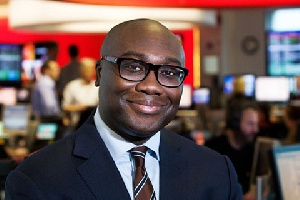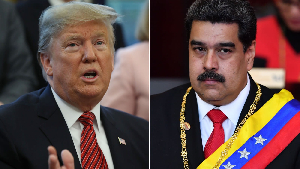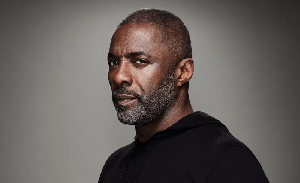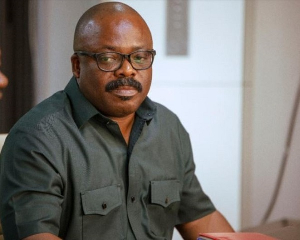Traditionally, he has been asking the questions and telling the success stories of others. But on this warm Saturday night, the guns were turned on Komla Dumor, when GB&F editor, Eric Kwame Amesimeku together with its General Manager, Andrew Padi Jnr. caught up with him at his Osu hideout while he was in town for a quick peek into his life.
There is one thing most people will do when success comes their way: brag about it and cover their past failures in life as if it was all smooth-sailing on their way up. Not with Komla Dumor, popularly called the 'Boss Player' by those who followed his exploits back in his days at Joy FM in Ghana. Komla currently presents Focus on Africa on BBC World News. The programme is the BBC's first ever daily television news programme for African audiences. Undoubtedly, he is seen by many as the African face of the news corporation.
Indeed, one of the most intriguing aspects of the story of this phenomenal news anchor with a baritone voice is not actually how he got to the BBC, but how the young Komla from a privileged background having been doubly-blessed with a chance to pursue a course in Medicine at the University of Ghana, a cherished dream of many Ghanaian students, ended up switching courses and pursuing instead a study path in Sociology and Psychology.
The telling sincerity of the man whose seemingly-smooth rise to the top took everyone unawares could be a guiding post for anyone who aspires to greatness. He states without a hint of hesitation that "I experienced failure and that is how I switched courses," and this boldness in confronting his failings in life, obviously played a crucial role in catapulting him to the acme of his career.
Journalist by Chance?
Having failed in his professional medical exams, Komla Dumor did not resign to his fate and lament over his failures, rather he did what most achievers do - picked himself up, dusted himself off and set himself on a different trajectory of life's journey.
According to him, the natural course for him to take after being withdrawn from the School of Medicine of the University of Ghana was to pursue a career path in Law or Psychiatry. To him, he virtually chanced on journalism unconsciously, but that was not the traditional journalism the world is quite acquainted with today - he started as a "traffic news reporter on a motorbike" on a programme called Mobitel Traffic Watch.
But as fate would have it, from this humble beginnings, Komla ended up in talk radio when he started presenting the morning show on Joy FM and as he says "That is when Journalism as a career choice" was seriously considered. Thus, like most young Ghanaian graduates whose search for their dream jobs had not materialized, pursuing journalism as a career was more of a stop-gap measure whilst a serious search for a permanent job was on.
Tools for success - Patience and Perseverance

Through his trying times in the University days and the challenges he had had to face in landing a job capable of sustaining him in life, Komla's most important propellers in life which he has to anchor his hopes on are "Patience and perseverance" which he considers as the "Most important personal values."
To him, his current status in his career/life did not come on a silver platter, to use the of-clichéd phrase. "'There is no such thing as overnight success" he says, explaining that he had experienced many disappointments in life but hard work and determination kept him going. "You can always have big dreams but you also have to have the patience to achieve them" he adds with an inspiring tone.
In here lies his pragmatism and his belief in the young African entrepreneurs who are trying very hard to make it in spite of the absence of governmental support as pertains elsewhere in the developed world. In a simple one-liner that encapsulates the hopes of every optimist, Komla says that "'You can make it wherever you are."
Challenges of a Pioneer
Ghana currently has one of the most liberalized media landscapes comparable to any in the developed democracies of the world. But the story has not always been the same. According to the France-based Reporters Without Borders (RWB), or Reporters Sans Frontières (RSF), a non-profit, non-governmental organization that promotes and defends freedom of information and freedom of the press, Ghana's media landscape is classified as being 27th out of 175, with 1 being most free.
The media environment in Ghana up until recently was a tightly-controlled one and not until the promulgation of the 1992 Constitution which returned the country to democratic rule on 7th January 1993, one always had to be careful what to write or say in the media.
"We are able to uncover rot and corrupt practices in society" Joy FM, the first of the private radio stations to be opened after this new-found media freedom was where it all started for Komla and the other brave hearts who ventured to break the cold ice of silence in the country but even as he says "'There were times radio presenters felt responsible for what people would say during phone-in programmes and thus one had to be careful in even allowing listener to call in."
Not to talk of the court battles that the budding Joy FM had to contend with in the courts of Ghana with Komla and his colleagues deeply embroiled in them. By and by, phone-in programmes designed by Komla and his colleagues like "Ghana Speaks" kept the national conversation going.
In spite of these initial challenges of intimidation and fear wrought on by threats of state interference, Komla believes that the experiment has been worth the risk as democracy has been the ultimate winner of this liberalized media environment. In his words"There is more scrutiny of public facials, of government and public issues as well." He adds that the fact that "We are able to uncover rot and corrupt practices in society" with the aid of the media, speaks of the enormous benefits that media liberalization has gained for Ghana.
Rebranding Africa
Finding a foot at the BBC for Komla Dumor was not such a difficult thing to do because as he says "There is a uniform standard for all employees of the corporation" and for him, working with some of the best producers, editors and presenters in the world makes his work much easier and his stay there enjoyable. Having found his foot at the corporation, Komla Dumor in 2011 begun presenting the "Africa Business Report" on BBC World News Television, a dedicated business programme for Africa which saw him traveling across the length and breadth of the African continent trying to tell the African Story to whoever cared to watch and listen.
For most Africans, this programme could not have come at a more opportune time than the age when Africa was beginning to pick itself from the years of war, civil strife and economic stagnation. More importantly, the programme seeks to tell the real African story different from the skewed image of Africa being a scar on the conscience of the world, to a rising continent whose business potentials know no bounds.
Though Komla Dumor is quick to rebuff the notion that the "Africa Business Report" was being used as a public relations campaign in order to rebuild and repair the battered image of Africa, the impact of such a TV programme driving investors to Africa cannot in be underestimated. He reiterates that the BBC's decision introduce such a programme and thus to unearth the business potentials of Africa, was simply to project its values of "Balanced reportage and objectivity in its news."
Africa in the eyes of the West
Throughout his travels in Africa, Komla says of coming across an enterprising new breed of people hungry for success and ready to experiment with their ideas with or without the help of their respective governments. To him, "There is enormous potential across the length and breadth of Africa" making Africa the best place to invest in this age. "No other region on earth offers the high level of Return on Investments (ROI) as Africa does," he adds.
Based on the increasingly conducive environment and a generally welcoming people, Africa is now being perceived as the next frontier of business. And with the numerous potentials available on the continent with an expanding middle class and fast growing economies, Africa now presents business opportunities it did not have several years ago. To Komla, based on these positive pointers and factors "'There is indeed a justification for the optimistic view of what is happening in Africa."
The High Point of an illustrious career
One would have thought that the highest point of Komla's career might have come during his time at the BBC when he has had the opportunity to meet and interview people from all walks of life, from Kings to slaves. But rather surprisingly, he talks of interviewing Brigadier Charles Moss "Charlie" Duke during his days at Joy FM as the highest point of his career.
Brigadier Charlie Duke, as he is popularly known, is a retired US Air Force brigadier general, and a former United States astronaut for NASA who was a module pilot for the Apollo 16 mission. Of course like any layman in rocket science, the thought of someone walking on the moon was unthinkable back then for Komla. Surely, he must have gotten over that shock by now!
Where would you want to be from here?
Variously, Komla's name has been linked with politics in his home country Ghana, but asked whether he would want to enter into politics, he retorts jovially that he does not know "Whether I will make a great politician because the role of every journalist is to tell the truth." Komla's future either at the BBC or elsewhere remains unknown to even himself for now. And rather unsurprisingly, his answer was as evasive as his future in politics when asked where he would want to be in the near-future. He the ever-hopeful pragmatist would rather want to take the day-by-day approach to life and rather hope for the best each day.
Call him an achiever and you might not be far from right, but for him, he is just a simple Ghanaian whose hard work and perseverance has goaded him to a level in life where everyone one would dream to be.
Business News of Thursday, 5 December 2013
Source: Ghana Business & Finance













